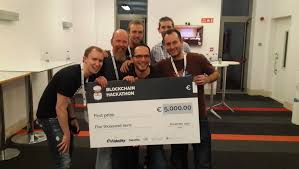bitcoin medic

Last Update November 4, 2015 After two devastating earthquakes in Nepal this summer, Medic Mobile’s team was unharmed and immediately ready to assist.Among many notable efforts, they have a new Antenatal program in the Dhading district to help strengthen health systems after the quakes.For more information, see the links below: Follow the history of our Medic Mobile Campaign More About Medic Mobile’s Antenatal Program Learn more about Medic Mobile’s overall efforts in Nepal Learn more About Medic Mobile around the world “The Medic Mobile team is actively exploring how we can help with local, coordinated relief efforts after the earthquake that devastated Kathmandu on Saturday, April 25th.Our third largest office is based there and very thankfully all of our teammates are safe.Now we’re focused on how to best help.The Bitcoin community has already been so supportive of our efforts in the past and we’d be grateful for that support again.Every donation will go directly to our Nepal office and help as we deploy the right technology to help.

Thank you from our whole team.”Today, you have more access to information about your health than ever before.From the personal tracking offered by Fitbit and Apple Watch to the genetic testing that 23andMe allows from the privacy of your home, new services now make it possible to access and store rich medical information about yourself in real time.
bitcoin lelystadYet the most basic and traditional of our medical information — the records generated by your doctors — remains trapped in a lockbox to which you have only very limited access.On average, Americans visit 16 different doctors in their lifetime.
bitcoin live rate in indiaWhile both the HITECH and the Affordable Care Acts now enable and in some cases mandate that data from your doctor’s visits be stored digitally, medical records and results from different facilities and physicians are often stored in incompatible databases.Despite the advances in consumer health technology so visibly on display at your local Best Buy, the ability to personally update your medical records with new information from your doctor, or with data from a device like a Fitbit, still escapes us.
bitcoin mehrwertsteuer
At the same time, your medical records are more insecure than ever, as evident from the increasing number of hacks and data ransom attacks against hospitals.MIT Graduate student researchers Ariel Ekblaw, Asaf Azaria and Thiago Vieira, along with Senior Research Scientist Andrew Lippman, are developing a cryptocurrency-backed technology to address these issues.They are developing a system, called MedRec, for managing medical records that use the Ethereum blockchain.MedRec restores patients’ control over their medical data.It does this by linking access to the patient’s medical records across the variety of their doctor’s databases.By functioning as an interface between institutions’ siloed health records it also has the potential to include personal sources of data like your Fitbit or 23andMe.In this way, it could, for example, help future generations more accurately answer questions about illnesses in the family, an increasingly important piece of data as precision medicine efforts scale up.

By putting your health records into a blockchain-managed system, you and your doctor should not only be able to update and review your medical information in real time, but also know it has been held securely.A novel design feature of MedRec is the way records are validated and added to the blockchain.The miners for MedRec are medical researchers who are rewarded with access to census-level data of the medical records.Similar to the census, the individual privacy of the person is protected, and the aggregate data is used for critical research.In essence, this is both a medical research blockchain, and a clinical one.Federal legislation has helped dramatically speed up digitization of medical records as well as incentivize data sharing with new pay for value payment models.There are various efforts to unify a patient’s medical records across the country and MedRec is a novel way to help us achieve that.To learn more about MedRec, read the research team’s latest publication here from the MIT Media Lab.

For the most up-to-date information, please visit the main site for our Medic Mobile Campaign and learn about how we are raising funds to supply mobile phones to health workers for the antenatal program in the Dhading District of Nepal.Last Update August 24, 2015 We recently met in San Francisco with Medic Mobile Founder Josh Nesbit, Asia Regional Director Jay Evans (stationed in Kathmandu), and Director of Communications Katie Kelly.It was a truly inspiring day with some amazing partners.Together, we have devised the best plan to make our funds go to the farthest to help with efforts in Nepal.More to come soon as we provide an update on the program!The Medic Mobile team is still unharmed now after the second devastating earthquake in Nepal.We are now partnering with ChangeTip and BitPay to bring our campaign to Twitter and the ChangeTip community.Once you have a ChangeTip account with some Bitcoin in it, you can tweet an amount, the word “bitcoin,” and @Medic and your donation will go to Medic Mobile’s Nepal-based team who is on the ground working to help with relief efforts and has been there since before the first earthquake hit.

Join us in supporting their team and the amazing work they are doing!Send a tweet and also you can use the form below to make a donation.Update April 26, 2015 – Focusing our campaign to support the Nepal-based team Since 2012, Medic Mobile has been based in Nepal, where their third largest office is located.Their team (pictured below prior to the earthquake) is thankfully unharmed from the earthquake.“The Medic Mobile team is actively exploring how we can help with local, coordinated relief efforts after the earthquake that devastated Kathmandu on Saturday, April 25th.Thank you from our whole team.” Medic Mobile’s Partners in Nepal: Visit Medic Mobile’s Blog for more information on how you can help in Nepal.MedVault, a proof-of-concept that would allow patients to record medical information on the bitcoin blockchain, won €5,000 in prize money at the Blockchain Hackathon this weekend.The event – held in Ireland and sponsored by Fidelity Investments, Deloitte and Citi – saw approximately 150 participants pitch ideas, form teams and build on concepts in just 50 hours.

Graham Rhodes, a MedVault developer, indicated that the project was able to separate from the competition because of its use of the blockchain to "anonymize" medical records."[We're] giving the patients control over their own medical records and the decision to make certain aspects public or private, while still being stored in a distributed global manner."The application can be seen as one of a growing number of both formal and informal projects that aim to use the bitcoin blockchain as a secure database for recordkeeping.Though only a proof of concept, Rhodes indicated that the concept advanced toward discussions on user experience.Patients using a fully developed product, Rhodes said, would be provided with a QR code of their public key or patient identifier, which a doctor could then use to access their medical records."The vision here was that if a patient is on holiday skiing, crashes into a tree and gets knocked out, [the patient has] a key fob or another way to access their patient identifier, and doctors can immediately view their medical records," he continued.